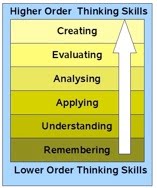Learning taxonomies: why ‘creating’ is not a cognitive skill.

Earlier today on Twitter I retweeted psuedo-academic blog post, commenting that (in my opinion) ‘creating’ is not a higher-order skill than, say, ‘evaluating’. This was the article, and to the right is the modification of Bloom’s Taxonomy in question.
The problem with Twitter is that it’s extremely difficult to have any kind of in-depth debate, especially as more and more people enter the fray.
The important tweets in the conversation went a little something like this:
[View the story “Learning taxonomies: why ‘creating’ is not a cognitive skill.” on Storify]
If someone asks you for ‘evidence’ your first response should be “What type of evidence would cause you to change your mind?” Often people use this as a defensive move when they’ve got an entrenched belief (or don’t want to think too hard about things). As a trained philosopher, I’m very happy to change my mind and find thought experiments much helpful in teasing out rational thinking.
Let’s come up with a thought experiment about this taxonomy. If ‘creating’ is at the top of a taxonomy then then it is, ipso facto, a higher-order skill than the cognitive skills below it. If that is the case, then it should be impossible to achieve that highest-order cognitive skill without some reference to those that are lower in it in the taxonomy.
The arguments that came back about ‘creating’ being a cognitive skill seemed to be predicated upon the idea of something being a ‘good’ example of a created thing. But nowhere in the taxonomy do value judgements come into it. Nor should they. Creating something is making something that wasn’t there before, no matter how ‘good’ or otherwise it may be. My son’s first attempts at art are ‘creating’ something just as much the expert woodworker turning a lathe to make beautiful hand-crafted furniture.
Let’s say that the woodworker in the example above was idly chipping away at a piece of wood whilst engaged in conversation with you. He doesn’t look down once at what he was doing, but by the end of the conversation he’s fashioned that piece of wood to look exactly like an acorn. In this case we’d say that his training and experience had enabled him to do that. But the act of creation and the act of creating something good are two different things.
Continuing the thought experiment, the woodworker passes the knife over to me. As someone with very little manual skills, I concentrate hard and chip away at another piece of wood, trying to create a little bird. The intention is there, but after half an hour I stop and it looks… like a smaller piece of wood. Despite this, my four year-old son takes one look at it and decides it looks like a monster! He takes it and goes and plays with it along with his other toys.
Creating something is on a different continuum than that of cognitive skills. Although cognitive skills are usually involved in the creation of something, they are not a necessary nor a sufficient condition for creation to take place. Instead, ‘creating’ is on a procedural continuum. You take X and Y and do this, then this, then this, then you have Z. At each of those points cognitive skills may be used, but not in every case.
To conclude, I believe Bloom’s taxonomy does need revising, just not by adding to it. Instead, I’d suggest that instead of ‘Evaluating’ being at the top of Bloom’s original pyramid and ‘Synthesis’ second-top, that these two are swapped around. This, I believe, fits in with the SOLO Taxonomy, an organizational schema which seems to be more relevant in 2011 than Bloom’s increasingly-dated attempt.

